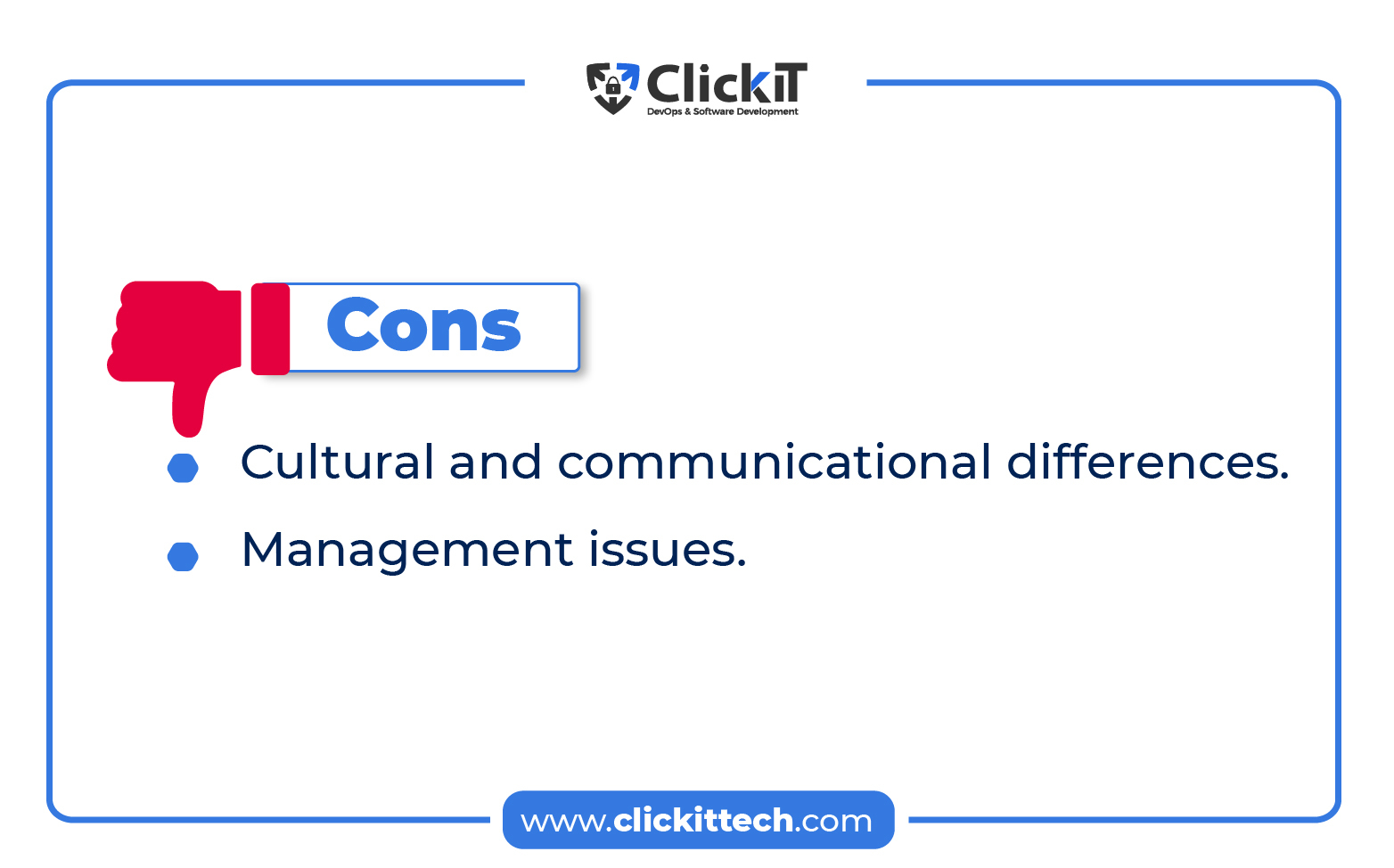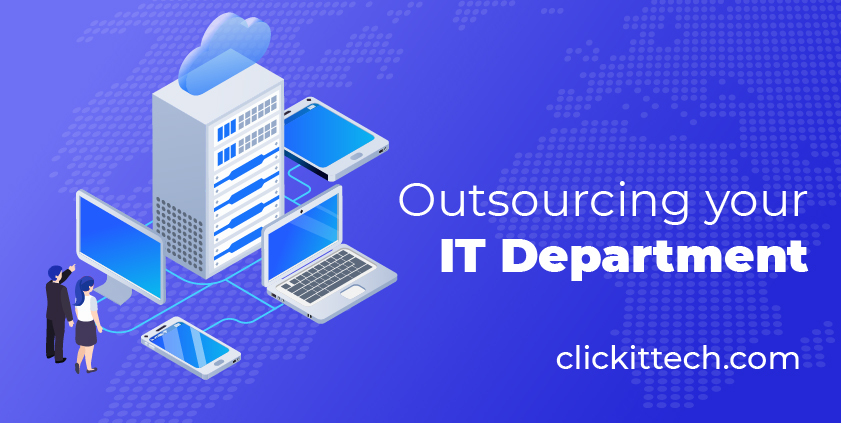Outsourcing IT Department will help you take the right step toward reducing costs when building teams and ensure you integrate talent that perfectly matches your goals and creates value for the company through their work. Outsourced IT department impacts organizations globally, as 83% of organizations managed to reduce costs using outsourcing, according to smbguide .
So, let’s look into what it means to outsource an IT department, which roles are ideal for this model, and what you should consider before choosing the perfect IT partner.
- What does it mean to Outsource your IT Department?
- Key Consideration for Outsourcing IT Department
- Pros and Cons of Outsourcing IT Department
- Roles in an IT Department you can Outsource
- Conclusion
- FAQs
What does it mean to Outsource your IT Department?
Outsourcing IT is the process enterprises and companies follow to subcontract their personnel to a third-party IT outsourcing company. More companies are choosing this business model as it offers benefits like cost-effective solutions, a large talent pool, and increased productivity.
Let’s give an example: You require a Load balancer Setup for your website or application since its traffic is growing considerably and you are ready to expand your business globally. You don’t want your customers to leave because that will mean a significant loss of revenue. Your requirements are:
- Quality
- Excellent Support
- Budget Friendly
- Efficient
So, you want a competent team of IT administrators to start managing your cloud infrastructure. Your first idea might be to hire personnel or even build a whole IT department. You’ll soon realize this is a huge task that requires a great number of your company’s resources. Beyond that, it could take a long time to find the right team for your project.
This is where you should consider an Outsourcing IT Department, as this option can provide a more cost-friendly solution for your project. This also can reassure you that you’ll get great results by hiring a professional team with the right abilities and technology to perform the tasks your actual crew might not be able to.
Read our blog for a full comparison between In-house vs. Outsourcing.
Key Consideration for Outsourcing IT Department
You should consider this when hiring an IT outsourcing company:
Understand the Outsourcing Model Your Business Needs.
The outsourcing model you choose must cover your project’s needs, whether we’re talking about a specific budget, communication process, or cultural affinity. The top outsourcing models include onshore, nearshore, and offshore.

Determine the Technical Expertise You’re Looking For
Your outsourcing IT department should be certified in crucial areas of your interest, such as the technologies your application is running in or the cloud that hosts it.
Look for References and Reviews
Request feedback from former and current clients, look for reviews from trusted sources like Clutch, and ask for samples of previous projects.
Inspect Communication and Client Management Systems
Evaluate with an experienced IT outsourcing company the working hours you’ll share and agree on which communication platforms you’ll use to follow up on the project, especially if you’re in different time zones.
Check Infrastructure and Technologies
Your outsourcing partner should assist your company’s needs and requirements with the right technology and infrastructure.
For example, if you’re developing a SaaS application, your team must choose the perfect SaaS tech stack.
Calculate Costs and Define the Budget
It must be a combined effort to determine the budget you’ll assign to your project and the actions your team will implement to optimize every resource available. This is a perfect example of how important it is to establish a great communication process with your outsourcing IT department.
Evaluate your Team
Besides comparing their technical knowledge, you should constantly evaluate soft skills, values, culture, and discipline when working with an outsourcing IT department. To make sure they align with your company in every essential aspect.
Read our blog on Remote Collaboration to learn more about the best practices for your team.
Pros and Cons of Outsourcing IT Department
Pros of an Outsourced IT Department
Lessened Costs
This is the main reason why companies decide to outsource since it eliminates the need for hiring, training, and maintaining a full-time in-house IT staff.
Large Talent Pool
When you decide to outsource your IT department, you encounter the opportunity to select from a variety of dedicated engineers from around the world, which may not be available locally.
Increase in Productivity
With Outsourcing you spend less time and resources on recruitment, training, and infrastructure for non-core function, incrementing productivity and efficiency.
Greater Range of Expertise
Th are many tech experts and professionals out there and with niche skills may not be available in-house outsourcing allow you to bring fresh perspectives and innovative solutions to complex problems.
Faster Project Delivery
Outsourcing firms can allocate dedicated teams to projects, ensuring faster completion times also when multiple teams work in parallel across different time zones project delivery speed up.
Scalability
You can easily adjust the size of your IT department to meet current demands without the long-term commitment of full-time hires, which provides flexibility in resource management.
Cons of an Outsourced IT Department
Cultural Differences
Collaborating with people from different cultures regarding work ethics, values, and business practices can lead to misunderstandings and conflicts. Also, varied public holidays and working hours can affect coordination and project timelines.
Communication Differences
When working in difrent time zones, communication problems and decision-making can arise; that is why you must outsource an IT team that manages constant updates on projects and uses diverse communication channels.
Discover how ClickIT delivers effective communication in each of their projects. Watch the video.
Management Issues
Lack of on-site presence can make it challenging to oversee daily operations and maintain control also, ensuring the outsourced team’s work meets the company’s standards and expectations can be difficult.



Which Roles Can an IT Department Outsource?
All IT processes that can be handled remotely can be outsourced and developed by a professional team.
These are some roles that apply for an Outsourcing IT Department:
- Junior, Middle, and Senior DevOps
- Business analyst
- Software Architect
- Project manager
- Software Developers
- Junior, Middle, Senior, and Lead Developer
- Junior, Middle, and Senior QA
- Junior, Middle, and Senior UX/UI Designer
- Graphic designer

Conclusion
But before you choose Outsourcing IT Department, there are some important factors to consider. Your project’s specifications, budget, and deadline are some of the most important aspects to evaluate. Also, remember the tech stack and expertise you need to determine if an Outsourcing IT Department can cover them for you.
If you want to see how an Outsourcing IT Department can directly affect your business, feel free to contact our ClickIT team today. We provide full-time support services that adapt to your tech needs. Our agile team also includes leading IT experts in application migration in the cloud, web security, web development, IT automation, clustering, scalability, and software outsourcing services.
Outsourcing
IT Outsourcing is the process of engaging a non-affiliated third party to execute certain IT activities for a firm. Outsourcing IT department establishes personnel to accomplish activities and an external organization’s resources for services and producing products.
When you decide to outsource IT department, it means you automatically have access to a broader talent pool with greater expertise than you could find close to you. Besides, you can save time and money by outsourcing the work and focusing on familiar tasks.
All IT processes that can be handled remotely can be covered by an IT outsourcing company. IT functions commonly outsourced include Data center operations, development and maintenance of websites and apps, network management, technical support, data security and recovery, and telecommunication.
Outsourcing enables organizations to leverage a global talent pool, increase productivity, access a broader range of expertise, achieve faster project delivery, and scale operations efficiently and cost-effectively.








